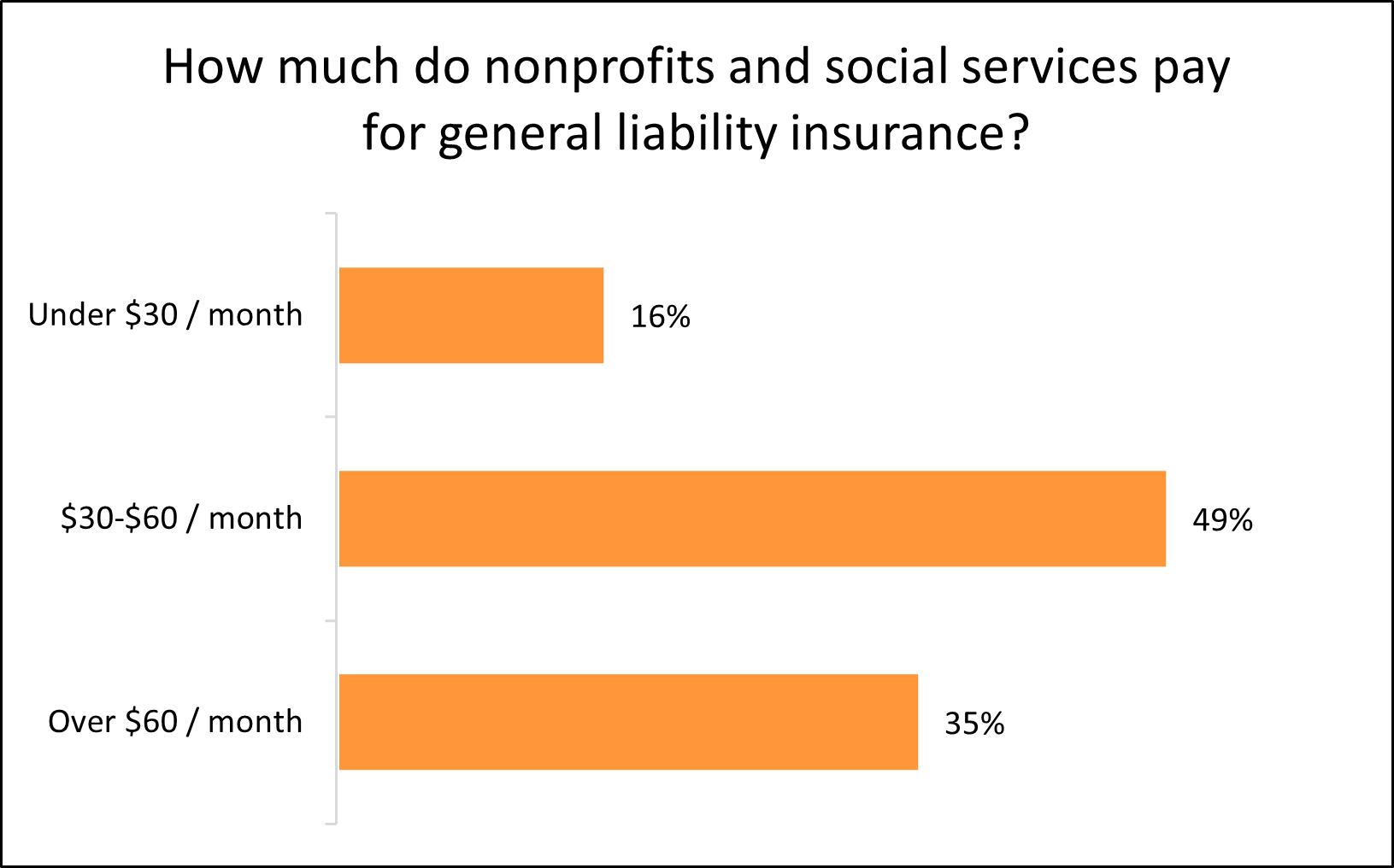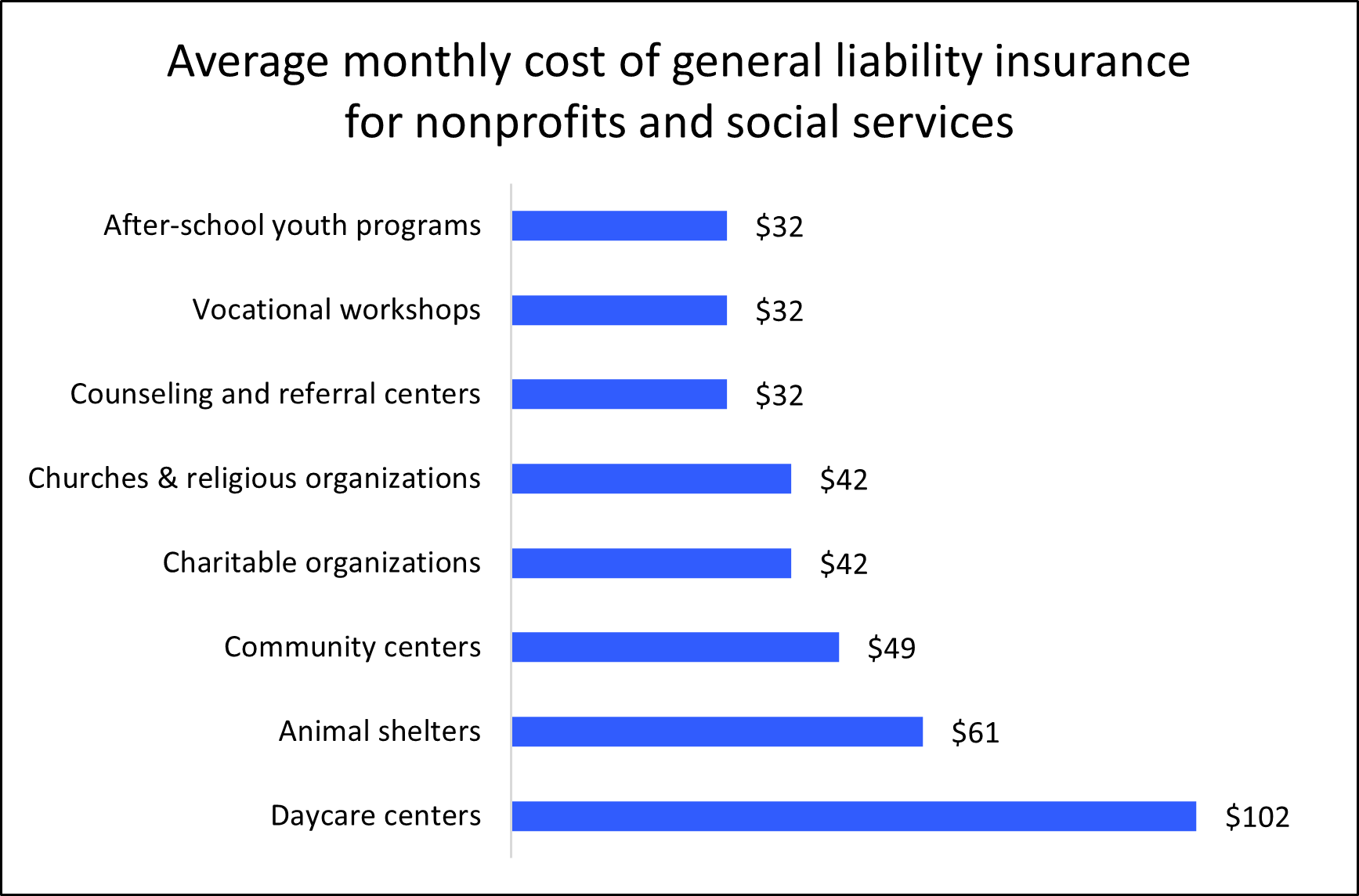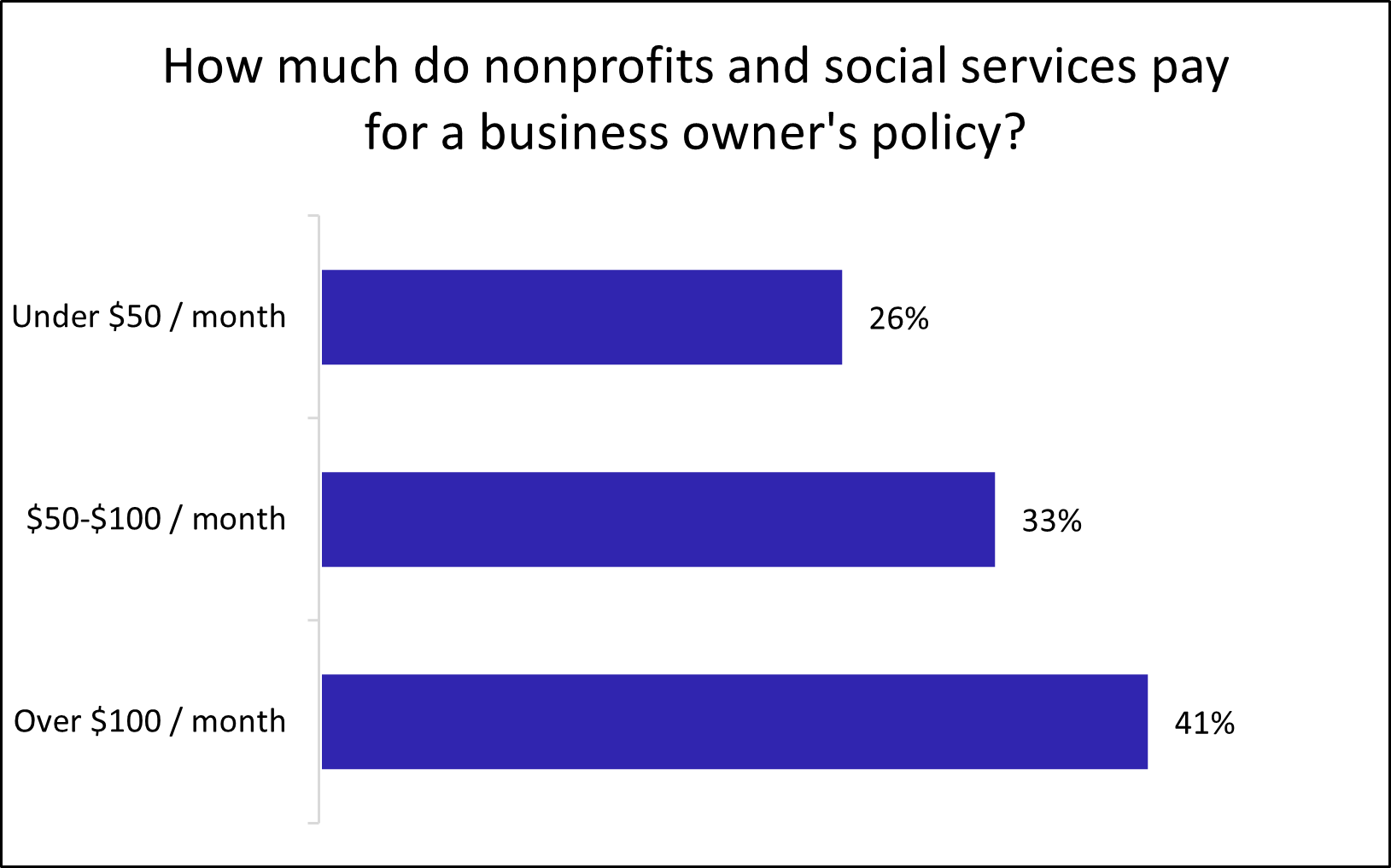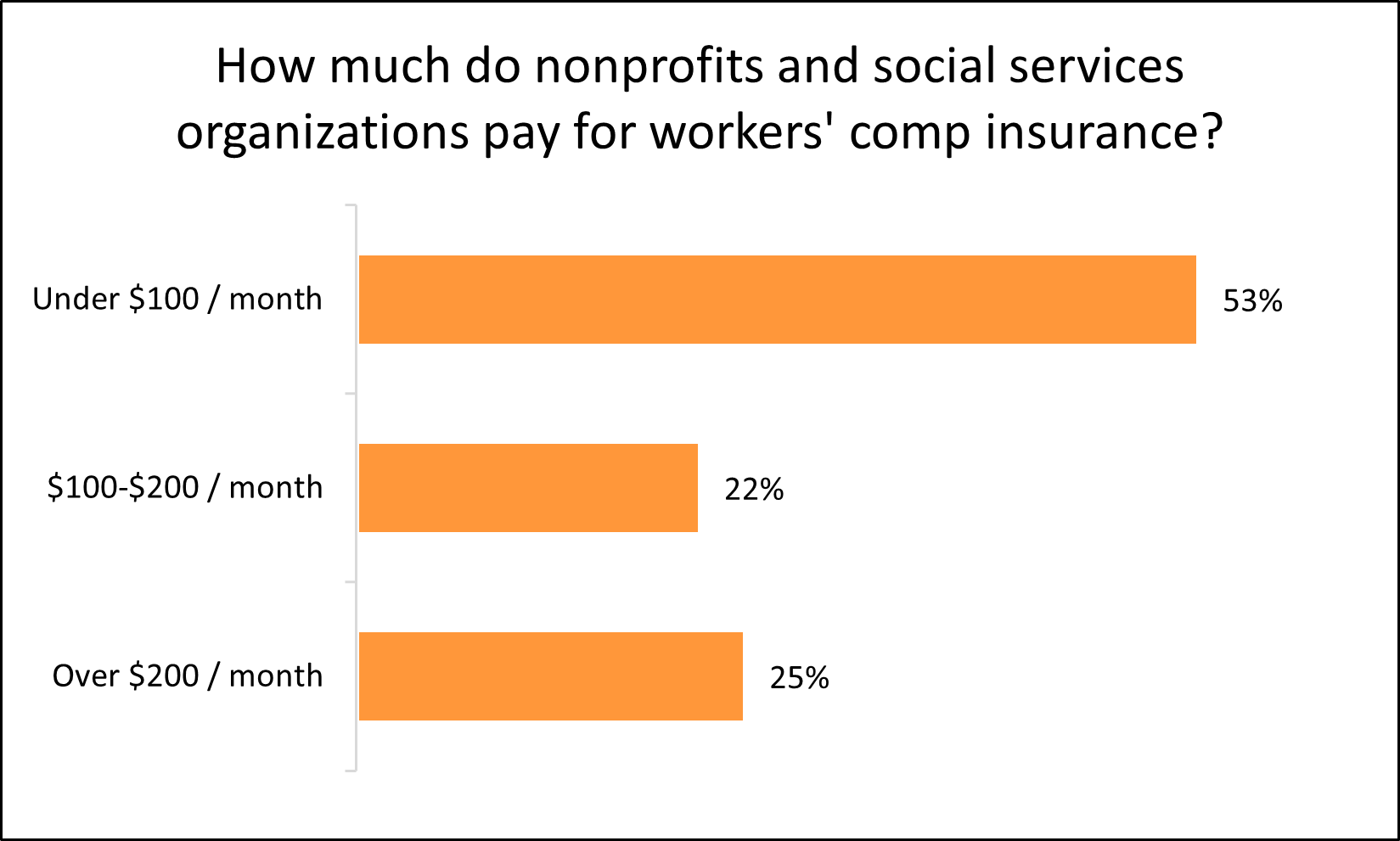How much does nonprofit insurance cost?
The cost of insurance for nonprofits depends on the policy and the amount of coverage you choose. Insurers will also look at your organization's size, revenue, and claims history. Save money on small business insurance by comparing quotes from different providers with TechInsurance.
Key insurance policies and their expected costs for nonprofit organizations
Here are the top insurance policies bought by nonprofits and social services and their average monthly costs:
- General liability insurance: $44 per month
- Business owner's policy (BOP): $84 per month
- Workers' compensation insurance: $85 per month
- Professional liability insurance: $63 per month
- Directors and officers insurance (D&O): $71 per month
- Employment practices liability insurance (EPLI): $64 per month
Our figures are sourced from the median cost of policies for nonprofits that apply for quotes with TechInsurance. The median provides a better estimate of your expected business insurance policy costs because it excludes outlier high and low premiums.
General liability insurance costs for nonprofit businesses
Nonprofits spend an average of $44 per month, or $531 per year, on general liability insurance.
Churches, charitable organizations, animal shelters, and other nonprofits may need this coverage in order to sign a commercial lease, get licensed, or work with certain clients.
General liability insurance covers legal costs when a third party (someone outside your company) files a lawsuit over property damage, a bodily injury, or a personal injury, such as invasion of privacy. It also covers copyright infringement and other advertising injuries.
For example, a member of your church might trip on a broken step and suffer an injury. Or, an employee at your charity might drop and break a client's laptop. If they file a lawsuit, a general liability policy would help pay for your legal costs.
This is the average general liability insurance policy for nonprofits that buy from TechInsurance:
Premium: $44 per month
Policy limits: $1 million per occurrence; $2 million aggregate
The cost of general liability insurance depends on several factors, including the policy limits and deductible you choose. Insurance providers will also consider your type of nonprofit, the size of your organization, and any additional insured endorsements you may have.
General liability insurance can be affordable for nonprofits
Among nonprofits that buy general liability insurance with TechInsurance, about half (49%) pay between $30 and $60 per month. Of those, 16% pay less than $30 per month.
Your policy limits, location, and business income affect the cost of your premium. You can help reduce your cost to an amount that better fits your nonprofit's budget by selecting lower coverage limits or a higher deductible.
The majority of nonprofit owners (92%) choose a general liability insurance policy with a $1 million per-occurrence limit and a $2 million aggregate limit.

Your profession affects the cost of a general liability insurance policy
The specific types of risks at your nonprofit are a major factor when determining your insurance costs.
That might include:
- Whether you have a storefront
- The amount of foot traffic
- Interactions with customer property
- The claims history of others in your profession
- Type of professional services provided
To some extent, you can predict how much you'll pay for insurance by looking at costs for similar types of nonprofits.
For example, after-school youth programs, vocational workshops, and counseling centers pay a lower average rate of $32 per month for a general liability insurance policy. On the other hand, daycare centers pay a higher rate of $102 per month.
Below, you can see how much different nonprofit owners pay for general liability coverage:

Business owner's policy (BOP) costs for nonprofit businesses
Smaller nonprofits that face few risks may be eligible for a business owner’s policy. Nonprofits pay an average of $84 per month, or $1,003 annually, for a BOP.
A business owner's policy bundles general liability coverage with commercial property insurance at a lower rate than buying these policies separately. It protects against the most common liability and property lawsuits, and helps your nonprofit recover financially after a fire, burglary, or other property loss.
This is the average business owner's policy for nonprofits that buy from TechInsurance:
Premium: $84 per month
Policy limits: $1 million per occurrence; $2 million aggregate
Deductible: $1,000
You can add business interruption insurance to a BOP to protect against the costs of a temporary shutdown tied to a covered property claim.
For example, this policy would help pay for employee wages and the cost of renting a temporary space if a community center closes for renovation after a fire. Not only will this coverage allow you to keep serving clients, but it can help you avoid financial losses related to the closure.
The cost of a business owner's policy mostly depends on the value of your business property. Other factors, such as your business operations and industry risks, can also affect your premium.
Save money on property and liability insurance coverage by purchasing a BOP
Fortunately, small nonprofits don't have to pay a lot for a BOP. Among nonprofits that buy with TechInsurance, 26% pay less than $50 per month for a business owner's policy. Another 33% pay between $50 and $100 per month.
Nonprofits that own property, such as a church or daycare center, can expect to pay more for a BOP. For example, daycare centers pay $151 per month, while vocational workshop programs pay only $53 per month, on average.
Because this policy includes property coverage, your premium primarily depends on the value of your business property and equipment. Other factors like your policy limits, deductible, and business income will also affect BOP costs.
By choosing lower coverage limits or a higher deductible, you can reduce your premium to an amount that fits your nonprofit's budget.


Workers' compensation insurance costs for nonprofit businesses
On average, nonprofit organizations pay $85 per month for workers' compensation insurance, or an annual premium of $1,022.
Workers' compensation coverage pays for medical expenses and provides disability benefits if you or an employee suffers an injury on the job, or develops an occupational disease.
For instance, if an employee at your animal shelter gets bitten by a dog, this policy would pay for their doctor appointments, prescriptions, and any other medical costs. It also supplies part of the income they miss out on while they're recovering and unable to work.
State laws determine when you need workers' comp. In most states, you need it as soon as you hire your first employee. Only Texas and South Dakota do not have requirements for workers' comp.
Most workers' compensation policies include employer's liability insurance. This type of insurance helps pay for legal defense costs related to workplace injuries.
Though sole proprietors and independent contractors aren't often required to carry workers' comp, it's still a good idea to buy this coverage. If you're injured on the job, your health insurance plan will likely deny the claim, leaving you with hefty out-of-pocket medical bills and significant financial loss.
The cost of workers' comp depends on occupational risks
The chance of an injury while at work is the biggest factor in determining workers' compensation insurance premiums. Nonprofit organizations that have a higher risk of injury should expect to pay more.
As you can see, over half (53%) of nonprofits pay less than $100 per month for a workers' compensation policy. Another 22% pay between $100 and $200 per month for coverage.
Insurance companies will take into account the number of employees you have, their occupational risks, and your claims history when calculating the cost of workers' comp.
Risk management techniques, such as providing goggles or other protective equipment to workers, can help you avoid injuries and keep your claims history clean, which in turn keeps your premium low.

Professional liability insurance costs for nonprofit businesses
Nonprofit organizations pay an average premium of $63 per month, or $750 annually, for professional liability insurance. This policy is also referred to as errors and omissions insurance (E&O) or malpractice insurance, depending on your industry.
Professional liability insurance helps pay for lawsuits related to accusations of professional negligence, such as an error that ends up costing a client money.
Below is the average professional liability coverage for nonprofits that buy from TechInsurance:
Insurance premium: $63 per month
Policy limits: $1 million per occurrence; $1 million aggregate
Deductible: $1,000
The cost of professional liability insurance depends on factors such as the policy limits and deductible you choose, your line of work, and your claims history.
Your profession impacts the cost of professional liability coverage
Your profession's risk of getting sued over the quality of your work is a key factor in determining your professional liability insurance costs.
This includes your chances of facing a lawsuit over:
- Mistakes and oversights
- Breach of contract
- Late or undelivered work
- Failure to meet a standard of care
You can get a good idea of how much you'll have to pay for insurance coverage by looking at the premiums for similar businesses.
For example, daycare centers are among those who pay the most for this policy, with an average of $223 per month. That's likely because negligence could result in a child getting harmed.
On the other hand, counseling and referral centers pay an average of only $43 per month for this coverage.
D&O insurance costs for nonprofit businesses
Nonprofits spend an average of $71 per month, or $854 annually, on directors and officers insurance. D&O insurance covers legal defense costs for board members and officers if they're sued for a decision they made on behalf of your organization, such as mismanagement of funds.
For example, this policy would cover legal fees if a member of the public who donated generously at a fundraiser finds out that the money was lost in a poor investment, and sues the board member who was responsible.
Some directors might ask for D&O insurance before they'll agree to join your nonprofit. Having this coverage helps attract top talent, as they'll be looking for positions where this coverage is offered.
Every nonprofit should carry this protection for its board of directors and its officers. You can often bundle it with employment practices liability insurance, another type of management liability insurance, at a discount.
The cost of directors and officers insurance primarily depends on the impact your board's decisions could have on someone else's finances. Other relevant factors include the number of employees and directors you have, your profession, your claims history, and the policy limits and deductible you choose.
EPLI insurance costs for nonprofit businesses
Nonprofits spend an average of $64 per month, or $765 per year, on employment practices liability insurance.
This type of coverage protects your nonprofit from legal defense costs when a worker sues over wrongful termination, discrimination, or another violation of employee rights.
Insurance companies consider many factors when determining the cost of EPLI. That includes the number of employees you have, your industry risks, your hiring practices, your employee turnover rate, and your policy limits and deductible.
How do I get affordable nonprofit insurance with TechInsurance?
Owners of small nonprofits can find affordable business insurance coverage in three easy steps with TechInsurance:
- Fill out a free online insurance application with details about your business.
- Compare custom business insurance quotes from top-rated U.S. providers in real-time.
- Choose the best policies for your business and pay the premiums to begin coverage.
TechInsurance's licensed insurance agents are available to help answer questions about state insurance requirements and find the right policies for your insurance needs.
Once you've bought a policy, you can download a certificate of insurance for peace of mind and proof of insurance. You can typically get insured within 24 hours of applying for quotes.

